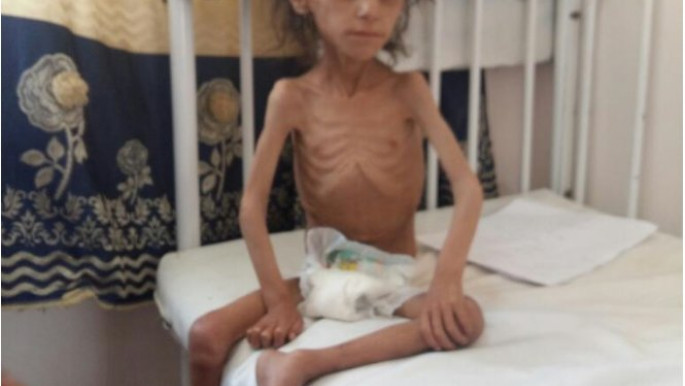Famine is already killing children in Yemen
His family's home was bombed by Saudi jets, and, like more than three million Yemenis, they were forced to pack up and leave.
With no income, they could not afford malnutrition treatment for Mohammed. Severely malnourished, he could not withstand the operation to remove a buildup of liquid from his skull.
His tiny body was buried by his family on Tuesday, April 18.
Ahmed Algohbary, a 24-year-old university student, went door to door, collecting money from his neighbours to help children like Mohammad whose parents could not afford treatment.
His efforts have saved one child's life already.
Jamal was able to recover his strength and his smile after only one month of treatment.
Now he wants to raise $1,000 to help Batol, a five-year-old who weighs just five kilograms (11lbs).
Ahmed Algohbary helps bury baby Mohamed [video via Jamila Hanan] |
Batol's family could not afford even one day of malnutrition treatment.
There are 17 million Yemenis - six in every ten people here - are in need of urgent assistance, according to a recent report by the IPC, an international body for monitoring food security. This is a 20 percent increase compared with a year ago.
Famine is officially declared when at least 30 percent of the population is severely malnourished, and two adults or four children out of 10,000 people die every day. Out of 22 provinces, seven are now just one step below this criteria, and 13 more are just marginally better, thanks to aid.
But famine already exists in pockets of the country.
Intense conflict along the west coast and a naval blockade impair the delivery of much-needed food and medical supplies.
 |
| Five year old Batol weighs a quarter of what he should [Photo via Ahmad Algohbary] |
The Pentagon is reportedly planning to attack the Houthi-held al-Hudeidah port on the Red Sea, which would be a strong blow against the Houthi-Saleh alliance fighting a coalition of nine Arab states led by Saudi Arabia since March 2015.
Twitter Post
|
Aid organisations warn such an attack would be a recipe for humanitarian disaster, as 90 percent of Yemen depends on food imports.
While Hudeidah port is already operating at reduced capacity, an increase in fighting here would bring the flow of food and medicines to a complete halt.
Even in the event of a "clean and fast" operation as envisaged by the Pentagon, damage to infrastructure would render the port useless for months.
Aid agencies are not only having trouble getting into Yemen, but also in raising funds from international donors.
The Trump administration pledged to slash the budget for USAID, the American foreign aid agency, by 28 percent in 2018. International funding is already scant: the UN World Food Program has already been forced to distribute smaller rations in order to reach the largest possible number of people.
Some Yemenis, feeling abandoned and isolated, have decided to self-organise.
"I have seen many of my people dying, they have nothing to eat or drink," Fatik al-Rodaini a journalist-turned-charity worker told The New Arab. "I decided to work in humanitarian aid because people need our help."
Mona Relief, the organisation he set up in 2015 with a friend, now has 120 volunteers.
 |
|
| Mona Relief delivers food to a blockaded village [Mona Relief] |
Unlike many international organisations, which are often accused by groups fighting of supporting one party over another - and then hampered in their work by both - Rodaini is able to negotiate access.
"We have agreed relationships with both warring parties, the Houthis and [the government of President] Hadi, so we coordinate with them and they know we are working for the people.
"We get access to places no one dares to go to."
Mona Relief started thanks to the generous help of a woman named Mona, who donated $1,000. It has since grown to deliver seven million meals to more than 20,000 families in critical need. By buying food from local farmers and delivering where it is most needed, Rodaini feels they can make a difference.
He is now preparing for Ramadan, when he plans to work at night, feeding 5,000 families across nine provinces.
But he is also frustrated with the difficulties in getting help to where it is most needed.
"International organisations here in Yemen have complicated mechanisms to be involved with. I went to OCHA [the UN Office for the Coordination of Humanitarian Affairs], and I told them 'there are more than 500 families in dire need, you must go there' - but no one reacted to my request.
"We later learned that these families are dying because they have no help."
Paola Tamma is a freelance investigative journalist who recently graduated from City University, London. She is currently researching Yemeni issues and society. Follow her on Twitter: @paola_tamma





 Follow the Middle East's top stories in English at The New Arab on Google News
Follow the Middle East's top stories in English at The New Arab on Google News


